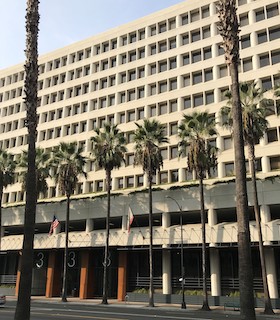On December 29, 2016, the Santa Clara County District Attorney’s office filed two informations (a criminal complaint following a preliminary hearing) against Mario Rodriguez.
One charged Rodriguez with making criminal threats (Penal Code § 422) on August 30, 2016. Bail was set at $25,000 in this case.
The other alleged multiple crimes that allegedly took place on November 6, 2016, including assault with a deadly weapon (Penal Code § 245(a)(1)) with an enhancement for causing great bodily injury (Penal Code § 12022.7(a)), oral copulation by force, violence, duress, menace or fear (former Penal Code § 288a(c)(2)), rape by force, violence, duress, menace or fear (Penal Code § 261(a)(2)), making criminal threats (Penal Code § 422), and inflicting corporal injury on a spouse, cohabitant, former spouse, or former cohabitant (Penal Code § 273.5(a)). No bail was allowed.
One year later, under Penal Code § 1368, the trial court judge in Santa Clara Superior Court declared a doubt about Rodriguez’s competency to stand trial and suspended proceedings.
On May 3, 2018, after the parties submitted the questions of competency on the examiners’ reports, the trial court judge found Rodriguez not competent. Three weeks later, on May 24, 2108, the judge signed an order of commitment committing Rodriguez in both of his cases to the Department of State Hospitals (DSH) for placement in a locked psychiatric facility for care and treatment under Penal Code § 1370(a)(2). The judge’s order stated the maximum term is three years minus zero days actual credit.
On September 7, 2018, the medical director at Atascadero State Hospital certified that Rodriguez was competent. The certification of mental competency was filed in the trial court on September 17, 2018. On September 20, 2018, the parties submitted on the examiners’ reports the questions of restoration to competency. The trial court judge then found Rodriguez’s competency restored and reinstated the criminal proceedings.
About four months later, on January 10, 2019, the trial court judge again declared a doubt about Rodriguez’s competency and suspended proceedings. On April 18, 2019, the parties submitted the question of competency on the examiners’ report and the judge found Rodriguez not competent.
 Court of Appeal Sixth Appellate District San Jose
Court of Appeal Sixth Appellate District San Jose
On May 16, 2019, the judge ordered that Rodriguez be committed to DSH for placement in a locked psychiatric facility for care and treatment under Penal Code § 1370(a)(2). On May 31, 2019, the judge signed the order directing DHS to provide placement for Rodriguez by 5:00 p.m. on June 14, 2019.
About six months later, on January 9, 2020, the medical director at Atascadero State Hospital certified that Rodriguez was competent. The restoration hearing was continued several times for various issues, including COVID-19 “shelter in place” orders and difficulties obtaining subpoenaed records for Rodriguez. Eventually, a hearing was set for a date in March 2021.
Before that hearing, however, Rodriguez filed an objection to the proposed restoration hearing set under Penal Code § 1372 because he contended he had already been in custody in excess of the two-year commitment period allowed by Penal Code § 1370(c)(1) (as the reader may be aware, effective January 1, 2019, the maximum incompetency commitment under § 1370(c)(1) was reduced from three years to two).
Rodriguez claimed that his incompetency commitment ran from “judicial determination to judicial determination” and thus his first commitment ran from May 24, 2018, to September 20, 2018 (119 days) and his second commitment ran from May 16, 2019, through March 16, 2021, the date of the new restoration hearing (670 days), which totaled 789 days, which exceeded two years.
The judge who received the objection overruled the objection, stating it could only calculate Rodriguez’s commitment period after it determined he had regained competence.
Rodriguez then filed a request for an extraordinary writ of relief in the Sixth Appellate District for relief from the trial court’s ruling. The Sixth Appellate District affirmed the trial court’s determination that Rodriguez’s maximum commitment period under § 1370(c)(1) has not yet run, that it may hold a restoration hearing to determine first and foremost if Rodriguez was competent.
Furthermore, the Sixth Appellate District held that the time between the filing of the certificate of restoration and the trial court’s approval of the certificate did not count toward the two-year limit. The court reasoned that because the certificate creates a presumption of competence and ends the treatment of defendant, the certificate stops the time that a defendant is involuntarily committed. Therefore, Rodriguez’s involuntary commitment did not exceed two years.
We are somewhat shocked by this ruling because while treatment may have stopped with the certificate of restoration being filed, Rodriguez remained in custody at a locked hospital and ineligible for bail or release to a local county jail. We think all the time that Rodriguez argued did count should indeed count.
More importantly, this summary exemplifies how difficult it is for a person to extricate himself from competency proceedings once a doubt is declared under Penal Code § 1368, all ostensibly in the name of public safety, which we believe is more of a euphemism for continued incarceration.
The citation for the Sixth Appellate District Court ruling discussed above is Mario Rodriguez v. Superior Court (6th App. Dist., 2021) 70 Cal. App. 5th 628, 285 Cal. Rptr. 3d 592.
For more information about competency issues, please click on the following articles:
 Court of Appeal Sixth Appellate District San Jose
Court of Appeal Sixth Appellate District San Jose